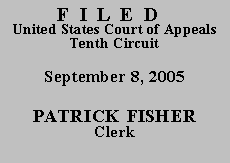

| RICHARD ALLEN THORNTON, |
|
Before BRISCOE, LUCERO, and MURPHY, Circuit Judges.
Respondent moved to dismiss Thornton's § 2254 petition as untimely and the federal district court granted the motion. The court noted that Thornton's conviction became final prior to the enactment of the Antiterrorism and Effective Death Penalty Act ("AEDPA"). Consequently, Thornton had until April 24, 1997 to file his federal habeas petition. Hoggro v. Boone, 150 F.3d 1223, 1225 (10th Cir. 1998). The one-year period was not tolled while Thornton pursued state post-conviction relief because he did not seek any such relief until April 24, 2003, a full seven years after the one-year period of limitation had expired. Fisher v. Gibson, 262 F.3d 1135, 1142-43 (10th Cir. 2001).
The district court then examined whether Thornton was entitled to equitable tolling of the AEDPA limitations period. The court concluded that Thornton was not entitled to equitable tolling because he failed to diligently pursue his claims and failed to demonstrate that his failure to file a timely § 2254 petition was caused by extraordinary circumstances beyond his control. Marsh v. Soares, 223 F.3d 1217, 1220 (10th Cir. 2000).
We review for abuse of discretion a district court's decision whether or not to equitably toll the one-year limitations period. Burger v. Scott, 317 F.3d 1133, 1141 (10th Cir. 2003). Thornton is not entitled to equitable tolling unless he can demonstrate that he diligently pursued the claims raised in his § 2254 petition. Marsh, 223 F.3d at 1220. The record before this court establishes that Thornton failed to act in a diligent fashion to preserve his right to file a federal habeas petition. Thus, it is clear that the district court did not abuse its discretion when it refused to equitably toll the one-year limitations period.
To be entitled to a COA, Thornton must show "that jurists of reason would find it debatable whether the district court was correct in its procedural ruling." Slack v. McDaniel, 529 U.S. 474, 484-85 (2000) (holding that when a district court dismisses a habeas petition on procedural grounds, a petitioner is entitled to a COA only if he shows both that reasonable jurists would find it debatable whether he had stated a valid constitutional claim and debatable whether the district court's procedural ruling was correct). Our review of the record demonstrates that the district court's dismissal of Thornton's § 2254 petition as untimely is not deserving of further proceedings or subject to a different resolution on appeal. Accordingly, this court denies Thornton's request for a COA and dismisses this appeal.
Entered for the Court
PATRICK FISHER, Clerk of Court
By
Deputy Clerk